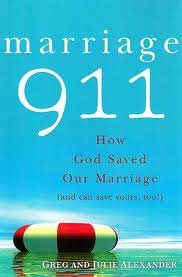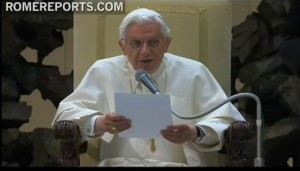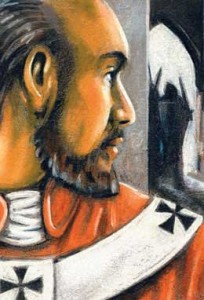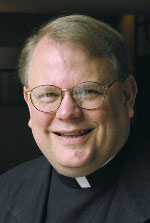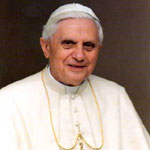[powerpress] Â 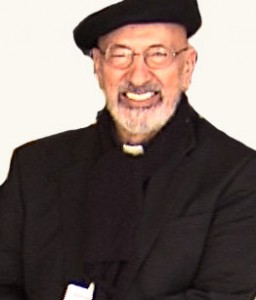 Msgr. Esseff offers a reflection on the Priesthood, particularly in the light of the Holy Thursday liturgy. Â The priesthood of the baptized is so very important, the role for each of us to be Jesus in the world today; however, those who have been called to the vocation of priesthood have a particular mission to fulfill. Â Msgr. Esseff discusses the importance of the priests relationship with God, the Father and his unique role in the celebration of the Holy Mass. Â He also talks of the need of prayer for priests and the value of priestly friendship.
Msgr. Esseff offers a reflection on the Priesthood, particularly in the light of the Holy Thursday liturgy. Â The priesthood of the baptized is so very important, the role for each of us to be Jesus in the world today; however, those who have been called to the vocation of priesthood have a particular mission to fulfill. Â Msgr. Esseff discusses the importance of the priests relationship with God, the Father and his unique role in the celebration of the Holy Mass. Â He also talks of the need of prayer for priests and the value of priestly friendship.
Tags: catholic, catholic podcast, catholic prayer, cathollc spirituality, Esseff, holy thursday, priesthood
This entry was posted on Monday, April 2nd, 2012 at 10:56 am
You can follow any responses to this entry through the RSS 2.0 feed.
[powerpress]
Msgr. Esseff reflects on Matthew chap 18 v 21-35.  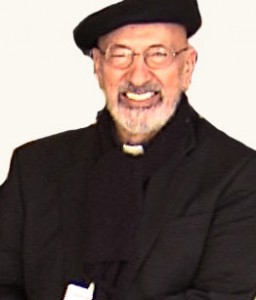 He shares the stories of a woman named Immaculee from Rwanda and young girl named Maria from Lebanon and the damage done by the hatred which is manifested in the world.  We have a capacity for communion…24 hours every day, 7 days a week.  How does that look in the
He shares the stories of a woman named Immaculee from Rwanda and young girl named Maria from Lebanon and the damage done by the hatred which is manifested in the world.  We have a capacity for communion…24 hours every day, 7 days a week.  How does that look in the 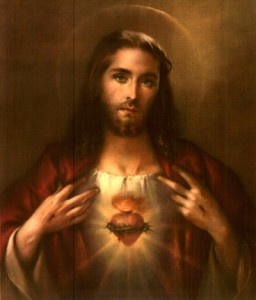 relationship found in marriage?  From childhood, there are deep wounds we carry from our parents…from siblings…or from others. What can cause those wounds?  The bitterness and resentment that we carry…the damage it does to us.  What is the remedy?  The joy of forgiveness…and forgetting.  Msgr. Esseff shares a poignant story of a man named John, and how he came to forgive what many would find “unforgivable”.
relationship found in marriage? Â From childhood, there are deep wounds we carry from our parents…from siblings…or from others. What can cause those wounds? Â The bitterness and resentment that we carry…the damage it does to us. Â What is the remedy? Â The joy of forgiveness…and forgetting. Â Msgr. Esseff shares a poignant story of a man named John, and how he came to forgive what many would find “unforgivable”.
This is the prayer mentioned by Msgr. Esseff in the talk...click here
Be sure to visit Msgr. Esseff’s website….”Building A Kingdom of Love”
Tags: catholic, catholic podcast, catholic prayer, cathollc spirituality, forgiveness, msgr. john esseff, reconciliation, unforgiveness
This entry was posted on Saturday, February 4th, 2012 at 3:49 pm
You can follow any responses to this entry through the RSS 2.0 feed.
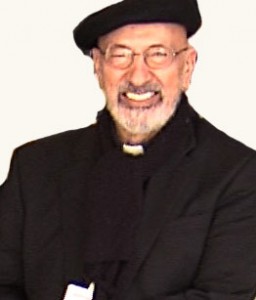 In January 2012, Msgr. Esseff conducted a weekend retreat for the Deacons and Deacon-Candidates and their wives of the Diocese of Fargo.
In January 2012, Msgr. Esseff conducted a weekend retreat for the Deacons and Deacon-Candidates and their wives of the Diocese of Fargo.
[powerpress]
The subject is SINFULNESS and the Sacrament of Reconciliation.  The crucifixion and death of Jesus and what Jesus “sees” from the Cross. We will not grow in the Divine life given to us in Baptism if we do not become fully aware of our sinfulness in direct relation to our blessedness.  The Devil is aware of  Christ in us; he hates the beauty of that union. The Enemy’s purpose is to destroy that relationship.  Why would we sin and endanger our union with Christ?  Sin is not just breaking a commandment, it is the destruction of the Divine life in us.  Sin is a 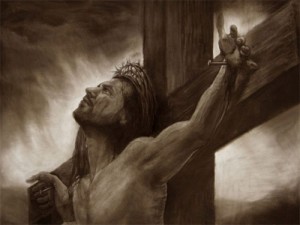 mystery; it is a darkness.  Our souls are a battleground…between the forces of light and the forces of darkness, the forces of love and the forces of hatred…a complete head on crash in every soul.
mystery; it is a darkness.  Our souls are a battleground…between the forces of light and the forces of darkness, the forces of love and the forces of hatred…a complete head on crash in every soul.
Msgr. Esseff then instructs on the importance of enlisting the aid of the Holy Spirit to truly prepare us for the Sacrament of Reconciliation.  It’s only through the aid of the Holy Spirit can God reveal to us what truly separates us from the  Father.  He reveals to us our “core wound”…the tendency in our behavior that causes us to sin.  Often we only pay attention to the symptoms of the wound, we need the Holy Spirit to show us the cause.  The deeper we go into our sinfulness the deeper the experience of the Divine Mercy.
Be sure to visit Msgr. Esseff’s website “Building a Kingdom of Love”
Tags: catholic, catholic podcast, catholic prayer, cathollc spirituality
This entry was posted on Wednesday, February 1st, 2012 at 8:58 am
You can follow any responses to this entry through the RSS 2.0 feed.
In “Marriage 911: How God Saved Our Marriage (and can save yours, too!)”, we meet 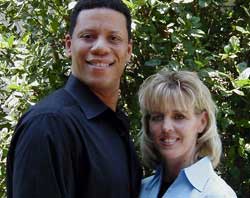 Greg and Julie Alexander, a great and courageous couple.  They candidly share the trials of what they felt was a lifeless, loveless marriage on the verge of divorce.  Married in the Church,  they began the process of seeking a way out of their union. Unexpectedly they encountered a faithful caring priest, who shared with them the Church’s understanding of marriage, and through incoporating those truths, revived and revitalized their sacramental relationship and their family as well.  Now married over 20 years, they offer emergency hope and guidance to couples struggling in a similar conditions through their “Alexander House” non-profit marriage and family life  enrichment apostolate.  Visit their outstanding website http://www.thealexanderhouse.org/
Greg and Julie Alexander, a great and courageous couple.  They candidly share the trials of what they felt was a lifeless, loveless marriage on the verge of divorce.  Married in the Church,  they began the process of seeking a way out of their union. Unexpectedly they encountered a faithful caring priest, who shared with them the Church’s understanding of marriage, and through incoporating those truths, revived and revitalized their sacramental relationship and their family as well.  Now married over 20 years, they offer emergency hope and guidance to couples struggling in a similar conditions through their “Alexander House” non-profit marriage and family life  enrichment apostolate.  Visit their outstanding website http://www.thealexanderhouse.org/
[powerpress]
Their breakthrough work in marriage has been featured on EWTN and talk radio, as well as in many publications, including Patrick Madrid s Surprised by Truth 3, Envoy, Catholic Herald, Denver Catholic Register, and Our Sunday Visitor.
You can find the book here
Tags: catholic, catholic podcast, catholic prayer, cathollc spirituality
This entry was posted on Monday, January 23rd, 2012 at 7:45 am
You can follow any responses to this entry through the RSS 2.0 feed.
What is the “Roman Canon”?  Fr. Milton Walsh helps us to answer that question and enter deeply into the mystery found in this beautiful Eucharistic prayer.  Drawing from the best of biblical and liturgical scholarship, Fr. Walsh offers a beautiful 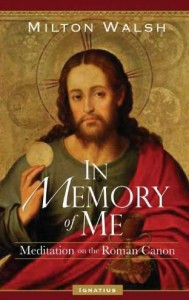 meditation that can help priests, religious, and laity deepen their understanding of the text that for centuries was the only Eucharistic prayer used in the Roman Rite.  This is a great book to give those in Catholic Adult Formation programs, like the RCIA, Diaconate training, Religious Education Catechist, as well as to the average “pew person” who longs for a deeper encounter in the depths of our Sacred Liturgy.
meditation that can help priests, religious, and laity deepen their understanding of the text that for centuries was the only Eucharistic prayer used in the Roman Rite.  This is a great book to give those in Catholic Adult Formation programs, like the RCIA, Diaconate training, Religious Education Catechist, as well as to the average “pew person” who longs for a deeper encounter in the depths of our Sacred Liturgy.
[powerpress]
You can Fr. Walsh’s book here
With a revised English translation of the venerable Roman Canon, many Catholics will be hearing it with new ears. This book will help them hear it with a new heart. Don’t just study the new words, step into the soul of Eucharistic Prayer I. —Rev. Paul Turner, Former president of the North American Academy of Liturgy
Tags: catholic, catholic podcast, catholic prayer, cathollc spirituality
This entry was posted on Friday, January 13th, 2012 at 9:01 am
You can follow any responses to this entry through the RSS 2.0 feed.
 VATICAN CITY, 11 JAN 2012 (VIS) 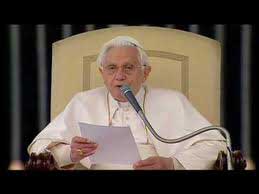
Jesus’ prayer during the Last Supper was the theme of Benedict XVI’s catechesis during his general audience, which was held this morning in the Paul VI Hall in the presence of 4,000 faithful.
The Pope explained how the emotional backdrop to the Last Supper, in which Jesus bade farewell to His friends, was the immanence of His approaching death. Moreover, in the days in which He was preparing to leave His disciples, the life of the Jewish people was marked by the approaching Passover, the commemoration of the liberation of Israel from Egypt.”It was in this context that the Last Supper took place”, the Holy Father said, “but with an important novelty”. Jesus “wanted the Supper with His disciples to be something special, different from other gatherings. It was His Supper, in which He gave something completely new: Himself. Thus Jesus celebrated the Passover as an anticipation of His Cross and Resurrection”.
The essence of the Last Supper lay in “the gestures of breaking and distributing the bread, and sharing the cup of wine, with the words that accompanied them and the context of prayer in which they took place. This was the institution of the Eucharist: the great prayer of Jesus and the Church”. The words the Evangelists use to describe that moment “recall the Jewish ‘berakha’; that is, the great prayer of thanksgiving and blessing which, in the tradition of Israel, is used to inaugurate important ceremonies. … That prayer of praise and thanks rises up to God and returns as a blessing. … The words of the institution of the Eucharist were pronounced in this context of prayer. The praise and thanksgiving of the ‘berakha’ became blessing and transformed the bread and wine into the Body and Blood of Jesus”.
Jesus’ gestures were the traditional gestures of hospitality which a host would extend to his guests, but in the Last Supper they acquired a more profound significance, Pope Benedict explained. Christ provided “a visible sign of welcome to the table upon which God gives Himself. In the bread and the wine, Jesus offered and communicated His own Self”. Aware of His approaching death, “He offered in advance the life that would shortly be taken from Him, thus transforming His violent death into a free act of the giving of Self, for others and to others. The violence He suffered became an active, free and redemptive sacrifice”.
“In contemplating Jesus’ words and gestures that night, we can clearly see that it was in His intimate and constant relationship with the Father that He accomplished the gesture of leaving to His followers, and to all of us, the Sacrament of love”, said the Pope. During the Last Supper Jesus also prayed for His disciples, who likewise had to suffer harsh trials. With that prayer “He supported them in their weakness, their difficulty in understanding that the way of God had to pass through the Paschal mystery of death and resurrection, which was anticipated in the offer of bread and wine. The Eucharist is the food of pilgrims, a source of strength also for those who are tired, weary and disoriented”.
Benedict XVI went on: “By participating in the Eucharist we have an extraordinary experience of the prayer which Jesus made, and continues to make for us all, that the evil we encounter in our lives may not triumph, and that the transforming power of Christ’s death and resurrection may act within each of us. In the Eucharist the Church responds to Jesus’ command to ‘do this in remembrance of me’, she repeats the prayer of thanksgiving and blessing and, therewith, the words of transubstantiation of the bread and wine into the Body and Blood of the Lord.
Our Eucharistic celebrations draw us into that moment of prayer, uniting us ever and anew to the prayer of Jesus”.
“Let us ask the Lord that, after due preparation also with the Sacrament of Penance, our participation in the Eucharist, which is indispensable for Christian life, may always remain the apex of all our prayers”, the Pope concluded. “Let us ask that, profoundly united in His offering to the Father, we too can transform our crosses into a free and responsible sacrifice of love, for God and for our fellows”.
At the end of his catechesis the Holy Father delivered greetings in a number of languages to the pilgrims present in the Paul VI Hall, inviting them to participate with
“faith and devotion” in the Eucharist which, he said, is indispensable for Christian life as well as being the school and culmination of prayer. Addressing young people, the sick and newlyweds, he pointed our that last Sunday’s Solemnity of the Baptism of the Lord is an occasion to reflect upon our own Baptism. “
Dear young people”, the Pope exclaimed, “live your membership of the Church, the family of Christ, joyfully. Dear sick people, may the grace of Baptism ease your sufferings and encourage you to offer them to Christ for the salvation of humanity. And you, dear newlyweds, … base your marriage on the faith which you received as a gift on the day of your Baptism”.
AG/Â Â Â Â Â Â Â Â Â Â Â Â Â Â Â Â Â Â Â Â Â Â Â Â Â Â Â VIS 20120111 (880) (more…)
Tags: catholic, catholic podcast, catholic prayer, cathollc spirituality, eucharist, last supper, lord's supper, prayer
This entry was posted on Thursday, January 12th, 2012 at 9:30 am
You can follow any responses to this entry through the RSS 2.0 feed.
VATICAN CITY, 28 DEC 2011 (VIS) – Prayer in the Holy Family of Nazareth was the theme of Benedict XVI’s catechesis during today’s general audience, which was held in the Paul VI Hall in the presence of 7,000 pilgrims.
“The house of Nazareth”, the Pope explained, “is a school of prayer where we learn to listen, to meditate, to penetrate the deepest meaning of the manifestation of the Son of God, drawing our example from Mary, Joseph and Jesus”.
“Mary is the peerless model for the contemplation of Christ”, he said. She “lived with her eyes on Christ and treasured His every word. … Luke the Evangelist makes Mary’s heart known to us, her faith, her hope, her obedience, her interior life and prayer, her free adherence to Christ. All of these came from the gift of the Holy Spirit, which descended upon her just as it descended upon the Apostles according to Christ’s promise. This image of Mary makes her a model for all believers”.
Mary’s capacity to live by the gaze of God is “contagious”, the Holy Father went on. “The first to experience this was St. Joseph. … With 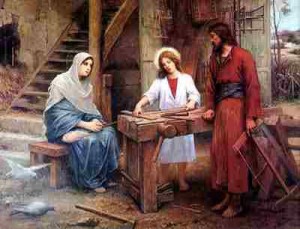 Mary, and later with Jesus, he began a new rapport with God, he began to accept Him into his life, to enter into His plan of salvation, to do His will”.
Mary, and later with Jesus, he began a new rapport with God, he began to accept Him into his life, to enter into His plan of salvation, to do His will”.
Although the Gospel has not preserved any of Joseph’s words, “his is a silent but faithful presence, constant and active. … Joseph fulfilled his paternal role in all aspects”. In this context, the Pope explained how Joseph had educated Jesus to pray, taking Him to the synagogue on Saturdays and guiding domestic prayer in the morning and evening. “Thus, in the rhythm of the days spent in Nazareth, between Joseph’s humble dwelling and his workshop, Jesus learned to alternate pray and work, also offering up to God the fatigue by which they earned the bread the family needed”.
Benedict XVI then turned his attention to the pilgrimage of Mary, Joseph and Jesus to the Temple in Jerusalem, as narrated in the Gospel of St. Luke. “The Jewish family, like the Christian family, prays in the intimacy of the home, but it also prays together in the community recognising itself as part of the pilgrim People of God”, he said.
Jesus’ first words – “Why were you searching for me? Did you not know that I must be in my Father’s house” – pronounced when Mary and Joseph found Him sitting among the teachers in the Temple, are a key to understanding Christian prayer. “From that moment, the life of the Holy Family became even richer in prayer, because the profound significance of the relationship with God the Father began to spread from the Heart of the boy (then adolescent, then young man) Jesus to the hearts of Mary and Joseph. The Family of Nazareth was the first model of the Church in which, in the presence of Jesus and thanks to His mediation, a filial rapport with God came to transform even interpersonal relations”.
“The Holy Family”, Benedict XVI concluded, “is an icon of the domestic Church, which is called to pray together. The family is the first school of prayer where, from their infancy, children learn to perceive God thanks to the teaching and example of their parents. An authentically Christian education cannot neglect the experience of prayer. If we do not learn to pray in the family, it will be difficult to fill this gap later. I would, then, like to invite people to rediscover the beauty of praying together as a family, following the school of the Holy Family of Nazareth”.
AG/VIS 20111228 (620)
Tags: catholic, catholic podcast, catholic prayer, cathollc spirituality, pope benedict xvi, prayer
This entry was posted on Sunday, January 1st, 2012 at 3:39 pm
You can follow any responses to this entry through the RSS 2.0 feed.
And what would happen next………
.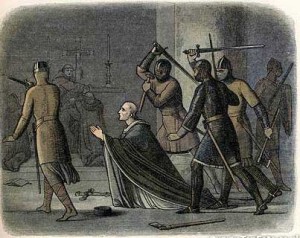
A strong man who wavered for a moment, but then learned one cannot come to terms with evil and so became a strong churchman, a martyr and a saint—that was Thomas Becket, archbishop of Canterbury, murdered in his cathedral on December 29, 1170.
His career had been a stormy one. While archdeacon of Canterbury, he was made chancellor of England at the age of 36 by his friend King Henry II. When Henry felt it advantageous to make his chancellor the archbishop of Canterbury, Thomas gave him fair warning: he might not accept all of Henry’s intrusions into Church affairs. Nevertheless, he was made archbishop (1162), resigned his chancellorship and reformed his whole way of life!
Troubles began. Henry insisted upon usurping Church rights. At one time, supposing some conciliatory action possible, Thomas came close to compromise. He momentarily approved the Constitutions of Clarendon, which would have denied the clergy the right of trial by a Church court and prevented them from making direct appeal to Rome. But Thomas rejected the Constitutions, fled to France for safety and remained in exile for seven years. When he returned to England, he suspected it would mean certain death. Because Thomas refused to remit censures he had placed upon bishops favored by the king, Henry cried out in a rage, “Will no one rid me of this troublesome priest!†Four knights, taking his words as his wish, slew Thomas in the Canterbury cathedral.
Thomas Becket remains a hero-saint down to our own times. From Saint of the Day
For a greater telling of this saint’s life – EWTN Library
Note: T. S. Eliot wrote a play — “Murder in the Cathedral” — about his life, and a movie — “Becket” (1964) — starring Peter O’Toole and Richard Burton has been made, too
Prayer for St. Thomas a Becket
Taken from the Roman Missal.
O God, for the sake of whose Church the glorious Bishop Thomas fell by the sword of ungodly men: grant, we beseech Thee, that all who implore his aid, may obtain the good fruit of his petition. Through our Lord Jesus Christ, Who livest and reignest with Thee in the unity of the Holy Spirit, forever and ever. Amen.
Tags: archbishop of Canterbury, Archishop of Canterbury, Canterbury cathedral, catholic, catholic podcast, catholic prayer, cathollc spirituality, Church, england, Henry II, martyr, matyrdom, middle ages, St. Thomas Becket, Thomas Becket
This entry was posted on Thursday, December 29th, 2011 at 5:19 am
You can follow any responses to this entry through the RSS 2.0 feed.
The New and Eternal Word, Monsignor James P. Moroney explores how the Church celebrates the Holy Mass in our day. In particular, he examines how a new Missale Romanum and a new English translation of these prayers can draw us more deeply into the words and rites of the Mass.
Tags: catholic, catholic podcast, catholic prayer, cathollc spirituality, eternal word, Monsignor James P. Moroney, Msgr. James P. Moroney, new mass translation
This entry was posted on Wednesday, December 7th, 2011 at 12:19 am
You can follow any responses to this entry through the RSS 2.0 feed.
VATICAN CITY, 30 NOV 2011 (VIS) – This morning’s general audience was celebrated in the Paul VI Hall in the presence of 5,500 faithful. Having recently completed a series of catecheses dedicated to prayer in the Old Testament, the Pope today began a new cycle on the subject of the prayer of Christ which, he said, was “like a hidden canal irrigating His life, relationships and actions, and guiding Him with increasing firmness to the total gift of self, in keeping with the loving plan of God the Father”.
One particularly significant moment of prayer followed the Baptism of Jesus in the Jordan. This, the Pope noted, poses a query as to why Jesus, Who was without sin, should have chosen to submit Himself to John’s Baptism of penance and conversion. John the Baptist himself raised the question, saying “I need to be baptised by you, and do you come to me?”. The Holy Father explained how “by emerging Himself in the Jordan River, Jesus … expressed His solidarity with people who recognise their sins, who chose to repent and change their lives. He helps us to understand that being part of the people of God means entering into a new life, a life in conformity with God. By this gesture Jesus anticipated the cross, beginning His active life by taking the place of sinners, bearing the weight of the sin of all humankind on His shoulders”.
By praying after His Baptism, Jesus demonstrates His intimate bond with the Father, “experiencing His paternity and apprehending the demanding beauty of His love. Speaking to God, Jesus receives confirmation of His mission”, with the words that resound from on high: “This is my son, the Beloved” and with the descent of the Holy Spirit upon Him. “Through prayer”, the Pope said, “Jesus lives in uninterrupted contact with the Father in order to achieve His project of love for mankind”. It is in this profound union with the Father that Jesus made the move for the hidden life of Nazareth to His public ministry. (more…)
Tags: catholic, catholic podcast, catholic prayer, cathollc spirituality, pope benedict xvi, prayer
This entry was posted on Wednesday, November 30th, 2011 at 7:49 am
You can follow any responses to this entry through the RSS 2.0 feed.
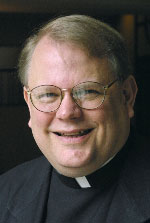 In this episode, Monsignor Moroney answers the question, where does the Mass come from?
In this episode, Monsignor Moroney answers the question, where does the Mass come from?
The New and Eternal Word, Monsignor James P. Moroney explores how the Church celebrates the Holy Mass in our day. In particular, he examines how a new Missale Romanum and a new English translation of these prayers can draw us more deeply into the words and rites of the Mass.
Tags: catholic, catholic podcast, catholic prayer, cathollc spirituality, eternal word, Monsignor James P. Moroney, Monsignor Moroney, new mass translation
This entry was posted on Wednesday, November 30th, 2011 at 12:07 am
You can follow any responses to this entry through the RSS 2.0 feed.
Supporting our Priests
[powerpress “faith-check-with-greg-youell”]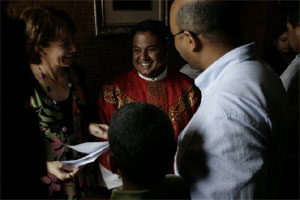
I once spoke with a priest of a large suburban parish with thousands of members, who told me that he could count the number of dinner invitations he had received over the past year from his parishioners on one hand.  This shocked me as I knew he was very busy with his ministry, and I assumed that he was frequently invited to the homes and activities of his parishioners.  Yet such was not the case.
It is easy to take our priests for granted.  Our priests are men who have sacrificed everything—marriage, family, children—for the sake of the Gospel.1  And yet they are but men who, like everyone, need to be encouraged, welcomed, and loved.
Let us find ways to involve them in the lives of our families.  Let us pray for them that they will grow in the grace of God and be protected from the attacks of the enemy;
And let us pray the Lord to send more priestly laborers into the harvest fields, so that the People of God might be sanctified, supported, and led in our earthly pilgrimage toward our Father’s House.
1Â -Â Â cf. Mt. 19:10-12; 1 Cor. 7:32-35
Tags: catholic, catholic podcast, catholic prayer, cathollc spirituality
This entry was posted on Monday, November 28th, 2011 at 6:37 am
You can follow any responses to this entry through the RSS 2.0 feed.
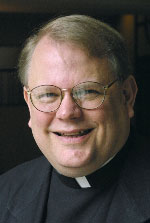 Monsignor James P. Moroney introduces to us the Collect for the First Sunday of Advent (from the new English translation of the Roman Missal, Third Typical Edition).
Monsignor James P. Moroney introduces to us the Collect for the First Sunday of Advent (from the new English translation of the Roman Missal, Third Typical Edition).
The last part of the introductory rites is the Collect prayer, or what is commonly referred to as the opening prayer. In the early Church, this prayer probably served to gather the assembly for worship, but now it serves to collect or focus the assembly’s prayer at the beginning of the liturgy.
The Collect is a carefully constructed prayer and can be broken down into several parts: the priest’s invitation to prayer, “Let us pray;” a brief period of silence for private prayer and recalling one’s own intention; the prayer itself (containing praise of God, a petition, and the hoped outcome for the petition); a concluding doxology, “Through Christ our Lord;” and the people’s response, “Amen.”
All of the Collect prayers have been retranslated in a way that more accurately captures their original structure and meaning in Latin. Obviously, some of the literary devices such as rhyme and word play, among others, will not shine through as they do in the Latin, and some of the sentences are long and complex. However, the words matter; the words articulate the truths of the Christian faith. The words shape and form us as a believing community, and the words contribute to the unity of the Church across the world.
Tags: catholic, catholic podcast, catholic prayer, cathollc spirituality, first sunday of advent, Monsignor James P. Moroney, new translation
This entry was posted on Sunday, November 27th, 2011 at 9:32 am
You can follow any responses to this entry through the RSS 2.0 feed.
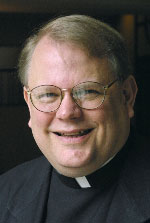 In this episode “Ars Celebrandi”, he explains how we are praying the Mass from the inside out.
In this episode “Ars Celebrandi”, he explains how we are praying the Mass from the inside out.
The New and Eternal Word, Monsignor James P. Moroney explores how the Church celebrates the Holy Mass in our day. In particular, he examines how a new Missale Romanum and a new English translation of these prayers can draw us more deeply into the words and rites of the Mass.
Tags: catholic, catholic podcast, catholic prayer, cathollc spirituality, Monsignor James P. Moroney, new mass translation
This entry was posted on Friday, November 25th, 2011 at 8:55 am
You can follow any responses to this entry through the RSS 2.0 feed.
November 19, 2011. (Romereports.com) The pope visited a shelter that welcomes dozens of abandoned children, some of whom are sick or malnourished. It’s called “Peace and Joy,†and it’s run by the Missionaries of Charity in Benin.
Cotonou’s Archbishop and the Mother Superior welcomed the pope, while children sang and danced for Benedict XVI.
Another 800 people, many of them children, waited for the pope in the nearby church of St. Rita. There, the pope talked about the day of his First Communion.
Benedict XVI
“The day of my First Communion was one of the most beautiful days of my life.â€He also said that during Communion, one should be ready to “receive Jesus with love and attention.â€
Talking to others about God is also key, said the pope. He described it as a treasure that should be used generously. The pope then explained to children how he prays.
Benedict XVI
“I can also use the Gospels. That way, I keep within my heart a passage which has touched me and which will guide me throughout the day.â€When it comes to praying, the pope asked them to pray as a family. He also called on children to encourage their parents to pray together as a unit.
Benedict XVI
“Ask your parents to pray with you! Sometimes you may even have to push them a little. But do not hesitate to do so. God is that important.!†ÂThe pope also explained what a rosary is and how to pray it.
At the end of the gathering, the pope gave a rosary to each one of the children.
During the pope’s international trips he usually sets time aside to meet with underprivileged children.
Tags: benedict xvi, catholic, catholic podcast, catholic prayer, cathollc spirituality, pope, pope benedict xvi
This entry was posted on Saturday, November 19th, 2011 at 8:11 pm
You can follow any responses to this entry through the RSS 2.0 feed.

